
views
- Use open body language by sitting up straight and making eye contact.
- Pay attention to body language that shows emotion, like sweating (which could mean nervousness) or clenched fists (which could mean anger).
- Use hand gestures while speaking to capture people’s attention and emphasize important points.
Understanding Body Language Concepts
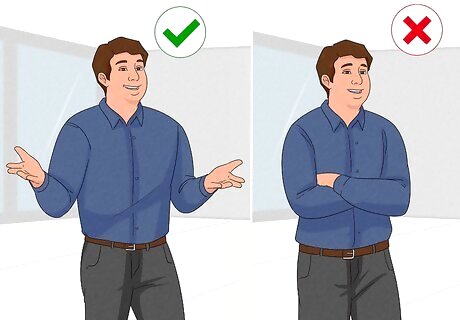
Practice open body language to invite others in. Use open or positive body language to exude confidence and energy. Have an assertive handshake, sit calmly, and be in control of all your gestures. Keep your posture relaxed but straight, and keep your legs slightly apart so you take up more space. Pause when you speak to draw in the listener and show confidence. Lean in slightly when a person is speaking to show interest (leaning away will show a sense of hostility). Don’t cross your arms. Instead, let them dangle at your sides or press them together in your lap. This shows you are open to other people. Keep your tone of voice level and appropriate for the conversation.
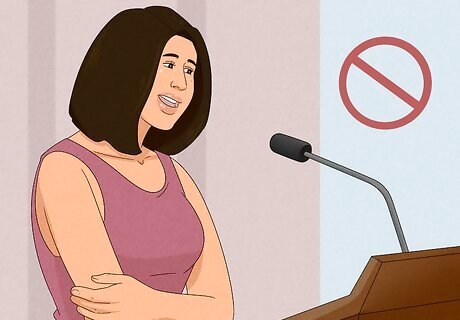
Avoid negative, or closed, body language when talking to others. If you are giving a presentation or speech, be as open as you can to your audience. Remove physical barriers that will limit your ability to connect, and don’t cross your arms while talking. Podiums, computers, chairs, and even a folder are all props that create distance between a speaker and audience, preventing a sense of connection. The best body language for public speaking is open body language without any barriers.
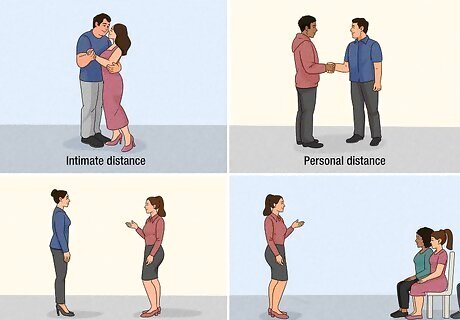
Use physical space in relation to how well you know the other person. Different cultures have different ideas about how much physical space, or proxemics, you should give another person. Social distance is broken down into 4 categories: Intimate distance. Defined as touching another person to 45 cm (18 in). If you enter a person’s intimate distance, this can be very unsettling for them unless it’s welcomed or you’re already intimate. Personal distance. 45 cm (18 in) to 1.2 m (3.9 ft). You are close enough to shake hands and to see each other’s expressions and gestures. Social distance. This is the normal distance in situations that are impersonal or business transactions, defined as 1.2 to 3.6 m (3.9 to 11.8 ft). Speech is louder, and eye contact remains important. Public distance. 3.7 to 4.5 m (12 to 15 ft). Teachers or group leaders often operate in public distance. Non-verbal communication is critical but often exaggerated. Hand gestures and head movements can be more important than facial expressions since many people won’t be able to see your face from far away.

Use your body language to convey emotions while you speak. Make a conscious effort to think about what your body is doing in different interactions with different people. You can take a look at yourself in the mirror while you talk, or you can think about what your body is doing when you’re angry, nervous, or happy. For instance, you might smile or laugh while you talk to indicate that you’re happy. You might clench your fists or scowl when you want people to know that you’re upset. Determine whether your body language is in sync with your message. Your body language is effective if it communicates the message you want it to communicate well. Does your posture radiate confidence, or does it make you seem unsure of yourself? If your non-verbal signals match your words, you'll not only communicate more clearly, you'll also be perceived as being more charismatic.
Gestures

Use hand gestures when speaking to draw others in. People who are great speakers are more likely to use hand gestures during conversations or presentations. Hand gestures give listeners greater confidence in the speaker, and they also help clarify what the speaker is saying. As you talk, use your hands to emphasize what you’re saying, point things out, or draw people’s attention to a certain area. More complex gestures involving 2 hands above the waist are associated with complex thinking. Politicians like Bill Clinton, Barack Obama, Colin Powell, and Tony Blair are considered charismatic, effective speakers, and that's partly because they frequently use hand gestures.
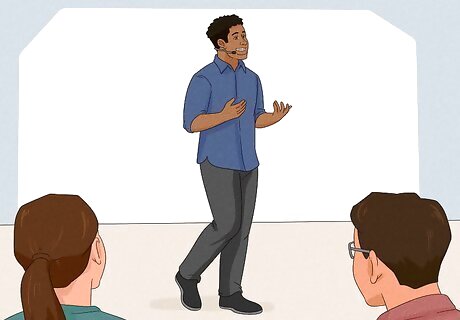
Move throughout the room to capture attention. Don’t just move your hands—move your body, too. If you have the space, walk confidently from one area to the next. Before speaking again, plant your feet and make eye contact to show that you’re confident and relaxed. Keeping your hands in your pockets when speaking or having a conversation will make you seem insecure and closed off. In contrast, if you take your hands out of your pockets and keep your palms upward, you will demonstrate that you are likable and believable.

Use gestures like a thumbs up to convey a specific meaning. Emblems are gestures that have an agreed-upon meaning within your culture. Use emblems to emphasize your point, or rely on them instead of saying words. To indicate aggression, clench your fists or bare your teeth. To show acceptance or peace, open up your palms and let your hands hang by your sides. Giving someone a thumb’s up or the okay sign (the thumb and index finger connected in a circle) are examples of emblems that can be used instead of words.
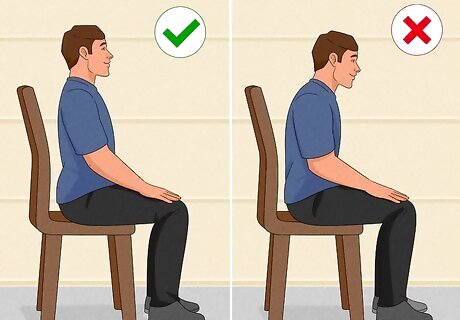
Maintain good posture to exude confidence. Slouched over or hunched posture can indicate boredom or a lack of engagement. To have good posture, keep your head up and your back straight, and lean forward if you’re seated. Sit at the edge of your chair, and lean forward slightly to show you’re interested and engaged. People tend to associate bad posture with low confidence, boredom, or lack of engagement. They might even think you’re lazy and unmotivated if you don’t sit up straight.

Mirror another person. Mirroring is when one partner mirrors the posture of the other partner. By copying the actions of the other person, you’ll make them feel connected to you and more at ease. When sitting next to someone, cross your legs at the same time as them. When you’re standing near someone, take a sip of your drink right after they do. You can mirror a person’s tone, body language, or position of the body. Keep it subtle so that it doesn’t come off as mocking. Mirroring is one of the most effective ways to use body language to build a rapport with someone.

Avoid gestures that show nervousness or insecurity. Keep a check on your other body language signals. Try to avoid wandering eyes, hands picking at fluff on your clothing, and constant sniffling. Touching your face or hunching over signals anxiety. To be confident and look approachable, keep your back straight and your hands away from your face.
Facial Expressions

Look at the person you’re talking to. When you are talking to someone, try to be the person who is “visually dominant” to demonstrate confidence. This ratio is determined by figuring out who is looking at the other person’s eyes more, and who is looking away more. Your visual dominance ratio helps determine where you stand on the social dominance hierarchy compared to the other person in the conversation. People who spend most of the time looking away have a relatively low amount of social dominance. People who are less likely to look away are higher up. People who look downward display helplessness because they seem like they are trying to avoid criticism or any conflict.

Use eye contact to show respect or attraction. The eyes are the windows to the soul, as the cliché goes. To show respect for someone, make eye contact and nod along as they talk. To show that you’re attracted to someone, catch their eye and give them a small smile. Avoiding eye contact at all, or looking downward with the eyes a lot, are both indications of defensiveness. When you’re giving a presentation to a room full of people, divide the room into thirds. Address comments to one side, and then the other side, and then the middle. Pick out a person in each section to address comments to. The people who are sitting around them will think you are making direct contact with them, and this will make them rate you higher as a speaker.

Avoid defensive body language, like scowling or not making eye contact. Certain body language gestures, including facial expressions, communicate defensiveness, not confidence. Thus, they make you seem less in control. Keep your face neutral to show acceptance and peace, or smile and laugh to show that you’re happy. Limited facial expressions and small, close to the body hand/arm gestures are indications of defensiveness. Turning the body away from the other person or crossing your arms in front of your body are other indications of defensiveness.
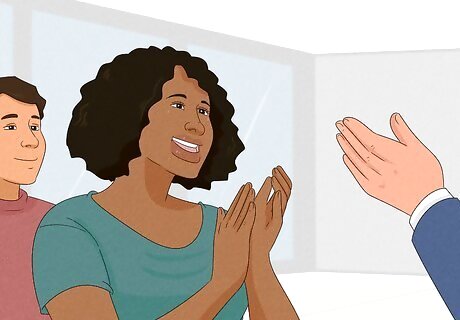
Stay engaged with your body language while listening to others talk. If you are the person watching the presentation, use your body language to seem engaged. Keep your eyes on the speaker and sit up straight to show that you’re listening. Staying engaged is especially important in virtual body language. If you’re listening to a speaker over a video call, be sure you’re sitting up straight and looking into your webcam so they know you’re listening. Heads tilted downward and eyes gazing elsewhere indicate disengagement. Slumping in a chair is a sign of disengagement. Similarly, fiddling, doodling, or writing (also called adaptors) are signs that a person is disengaged.
Decoding Body Language

Look for nonverbal cues that show what someone is feeling. Nonverbal cues can help you understand the emotions behind what someone is saying. If you think someone is angry, look for a flushed face, barred teeth, or clenched fists. If you think someone is nervous, check for a pale face, dry mouth, varying speech tone, and tension in their muscles. Other signs of nervousness include trembling lips, fidgeting, and gasping or holding breath.

Watch for nonverbal cues that mean someone is lying. Body language can give away liars. They might be able to hide their lies in their words, but their bodies often tell another story. You can spot when someone is lying by looking for a lack of eye contact, complexion changes, or sweating. They may also turn their body away from you as they talk. Be aware that some signs of lying—sweating, poor or no eye contact—are also indications of nervousness or fear.

Gauge someone’s interest by looking for nods or smiles. When you’re talking to someone, look for regulators, or expressions that provide feedback. If your conversation partner is interested in what you’re saying, they’ll likely make eye contact with you or nod along. If they aren't interested, they might glance away often or have a blank expression on their face. You can show empathy towards another person by using affirmative movements, such as nodding your head and smiling. These gestures give them positive reinforcement and show you like what they are saying.














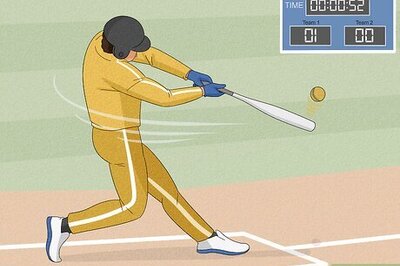



Comments
0 comment